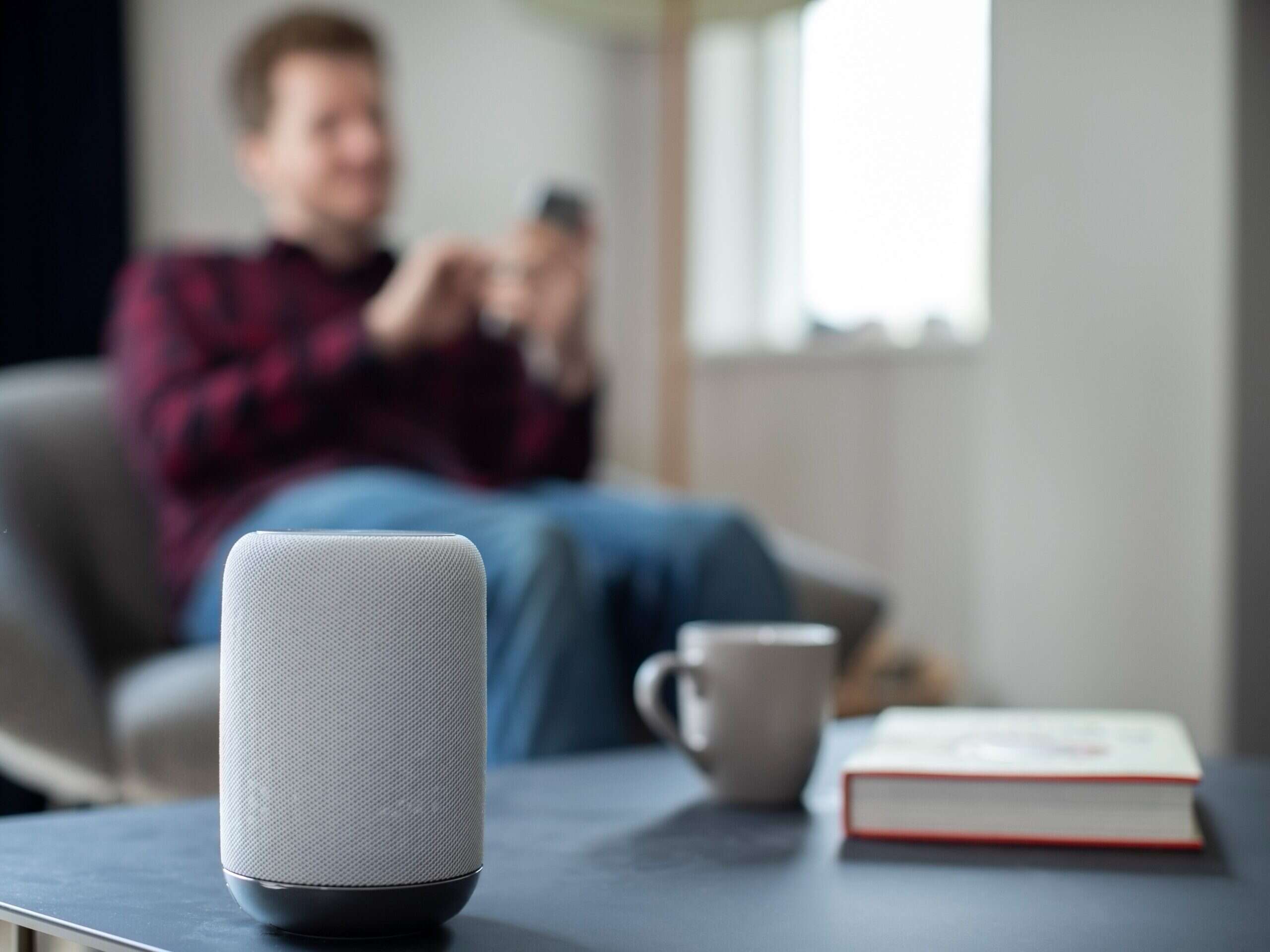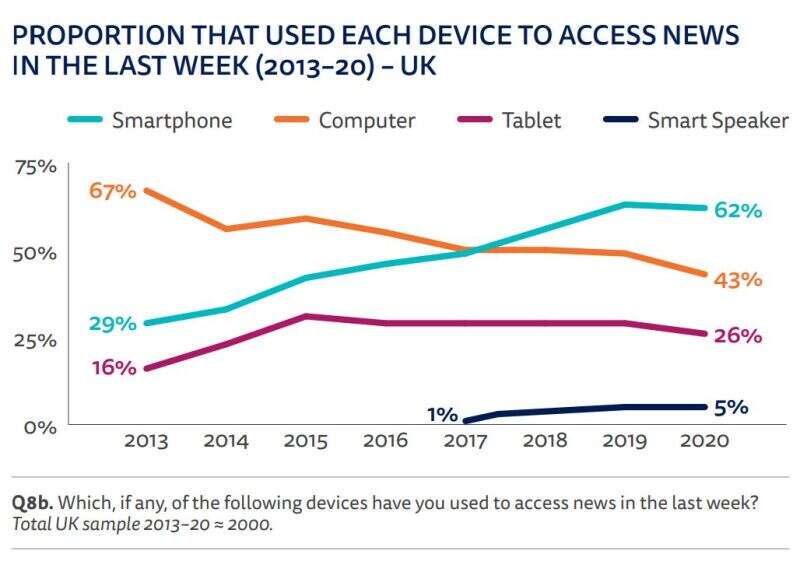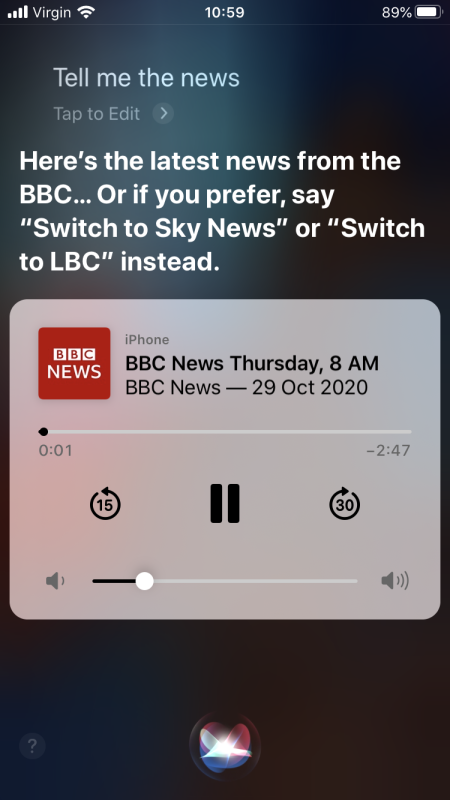
“Smart audio” is an ongoing revolution in the way we get our news that should be seen as on a par with social media or touchscreens, say those in the know, and news organisations need to be paying attention to it.
There are three main competitors in the smart speaker (and voice assistant) space: Apple (Siri), Amazon (Alexa) and Google (Google Assistant).
The first widely available smart speaker, featuring an AI voice assistant that could interact with users and respond to voice commands, was the Amazon Echo, which launched in the US in 2014 with Alexa.
Google followed in 2016 with its Home and Mini smart speakers using Google Assistant and two years later Apple released Homepod.
There are other services, such as Samsung’s Bixby and Microsoft’s Cortana, which are playing catch up, and in China Alibaba’s Tmall Genie and Xiaomi’s Xiao AI are serious contenders to the US tech giants.
Amazon and Google were the top two brands in 2019 with a combined global market share of more than 50%, per one report. When it comes to news, all three offer an audio bulletin service with varying degrees of interactivity.
Smart speakers have taken over from smartphones as the main area of growth for smart audio, shown by Apple’s move into the market.
The Reuters Institute’s Digital News Report 2020 found that smart speaker usage grew five percentage points to 19% in the UK that year. Only about 5% of the UK population used a smart speaker for news, but this is up from 1% three years earlier.

We polled Press Gazette readers, asking: “Do you ever use a voice assistant (Alexa, Siri etc.) to access news content?” Of just over 500 who responded, some 18% said ‘yes’.
While news uptake on smart speakers is low, it is growing. The technology is affordable for most and continually improving.
On-demand bulletins vs ‘atomised news’
There are two broad divisions in smart audio news (be it through smart speaker or other smart device): on-demand news bulletins and what some call “atomised news”.
The former comes in what’s known as “flash briefings”, which are news bulletins of usually no more than two minutes’ length that play when a voice assistant is asked to “tell me the news” or “play the news”.
The BBC is the default news provider for flash briefings across Amazon, Apple and Google devices, but users can tell them to “switch” to a rival outlet, with LBC and Sky News also offering the service.

“Atomised news” is where answers to specific current affairs questions are given, such as “who is the front runner in the US presidential election?”
Asking a specific question of a voice assistant on a news topic will more often than not result in it pushing you to a series of links to related news items. Google in particular is looking to develop a voice response.
Nic Newman, senior research associate at the Reuters Institute, told Press Gazette that “serving up the best answer to a particular voice query” is “the Holy Grail” that tech companies are seeking.
“All of the platforms are essentially trying to turn that into audio,” he said.
“Trying to get that to work across news is really hard, but that’s essentially what Google is trying to do right now, and other platforms are working with publishers… not just having bulletins but being able to ask a specific question about something that’s happening in the news.”
Already some publishers are experimenting with “voice metadata” to turn text into speech that can be read out by a voice assistant. Again though, this is still not widely used in newsrooms or widely available to users.
‘It’s much harder for a newspaper to do this…’
It’s perhaps no coincidence that broadcasters have so far dominated news by smart speaker.
“Obviously this is something that radio and TV is set up for, and news agencies, they have all the clips, they have the broadcast skills, so it’s a pretty simple lift for them to either re-version radio bulletins to do this, or to create something at relatively little extra cost,” said Newman.
“It’s much harder for a newspaper to do this… some have done it with synthesiser voices, turning headlines automatically into something that sounds like a bulletin… but most publishers are focusing more on long-form podcasts, because it’s more in their wheelhouse.
“The Guardian is focusing on Today, its daily podcast which is 25 minutes or so long, and that’s a very different proposition, but it’s one that’s much more suited to many newspapers.”
BBC is ‘leaning into’ smart audio
At the BBC, smart audio is a technology the newsroom is “leaning into”, according to Mukul Devichand, executive editor for voice and AI.
“I’ve got a sense that AI assistants are going to be a technology that has as much impact in the medium to long term on the way people get news as other technologies have had,” he told Press Gazette, adding it should be seen in the same way as social platforms in terms of impact.
“This technology is really exciting, but it has the potential to be another big disruptive change in the way people get their news and information and so we thought it was important to lean in from the start.”
The BBC has been offering its flash briefing service on smart speakers since 2017 and in 2019 it launched an interactive news briefing, which Devichand said was a UK if not a world first, that enables listeners to skip stories or ask for more on a particular story with simple verbal commands.
Devichand described it as a “big step forward”, although it is currently only available on Amazon’s Alexa, with the BBC also hoping to make it available on Google Assistant and other platforms.
Production of this service is carried out by a team within the radio news department, said Devichand, who does not see smart audio as “entirely distinct” from radio and so requiring a separate approach.
“I thought it was very important that this becomes the work of the radio newsroom, or the BBC newsroom, because I think sometimes we do digital innovation as some kind of separate thing, but actually this is part of serving our audiences,” he said.
“It might be that [BBC health editor] James Gallagher might occasionally do a two-way that’s specifically for the smart speaker [service], but it’s fundamentally the same journalism that he’s doing.”
“I don’t think the smart speaker is going to be some other medium so distinct from the rest of the BBC’s journalism that it requires a separate approach.”
As well as growth, it also represents a “revitalisation” for radio, Devichand said, with smart speakers reaching a different demographic to the “classic radio heartland” and so presenting an opportunity to bring the BBC’s audio reporting to a new audience whom it might not otherwise have reached.
He said smart speakers were a “significant platform” for the BBC, with an audience in the millions across news and other content, and is growing.
“It’s unlikely to be a flash in the pan at this point, it’s already got significant user uptake,” he said in the way of advice to publishers.
“The key thing to watch is how much others are investing in it, not just publishers. Amazon, particularly, and Google, and now Apple with their $99 Homepod, are significantly pushing in the space.
“I’m not sure that they are making a huge profit yet. I think at the moment they feel that to be the gatekeeper of a world in which people talk to the internet is a really valuable place for them to be. And that is the reason that they are all enthusiastically embracing this smart audio market.
“I think, as a publisher, you have to be mindful of that because it’s not just people that are voting with their feet, it’s also the resources being put there by the big tech firms, so there’s every reason to think that this area will grow.”
The BBC has even launched its own voice assistant, called Beeb, and ran the “Coronabot” chatbot for Covid-19 questions in Facebook Messenger.
Devichand said his interest was not in “answering all questions about everything” through the news group’s smart audio offering, but rather “making available the BBC’s best journalism on a very wide range of topics into this new ecosystem” and retaining its editorial values.
He added: “One of the approaches is obviously to make sure that when you’re talking to the BBC then you stick with the BBC,” which he said was behind its creation of Beeb. “That’s very much trying to enable an actual conversation with the BBC over which we have editorial control.”
Evening Standard is learning from experiment
In the commercial news sector, the Evening Standard is one newsbrand that has a dedicated team producing smart audio content. It is a partner news publisher for Google Assistant’s Your News briefing in the US – a personalised news service that’s not yet available in Europe.
Asking Google Assistant “what’s my news today” will bring up short audio reports from a selection of news providers, with the Standard, Washington Post and The Hollywood Reporter among them.
The Standard employs three full-time journalists working seven-days a week on Google Assistant content, alongside freelancers, which is funded by the Google News Initiative.
The title offers up a mixture of stories from the daily newspaper and online – covering news, showbiz and technology – as well as original breaking news content, all scripted in 30-second soundbites.
David Marsland, head of audio at the Standard, told Press Gazette one benefit was that the team was able to use its work for the Google voice assistant as an experiment for content on its own channels.
“We can take our stuff From Google News – we know what’s successful there – and trial and experiment and advance things that way,” he said. “So it helps us very much in seeing what audiences enjoy and helps us develop new shows from that.”
Marsland said technology stories had proven very popular on Google’s Your News service, which led to it creating its own daily science and tech podcast, which runs between five and seven minutes long, and is now available on Spotify’s Your Daily Drive.
It comes as part of the Evening Standard’s transformation into a digital-first news organisation as Covid-19 lockdown has decimated its ad-reliant, free print distribution model.
“We’ve only been running an audio department for just over a year, so it’s brand new to the Evening Standard, and it’s just a new way of reaching audiences with our news,” said Marsland.
“It’s also opened up a new thing for audio itself. People think about audio as being long podcasts, but this is very short-form audio which has only just started, because of voice assistants, to get into people’s homes.
“So we’re able to get in there at a really early stage, do the work, check the analytics, see what’s happening, see what people like and form a brand new way of doing audio. We’ve discovered that these shorter things work quite well.”
Marsland said smart audio was “another way of enhancing the Evening Standard’s reputation in the digital age” and was an “interesting space” for the newsbrand to be in. “I think audiences are only going to grow,” he said.
Though he said the Standard was “very pleased” with the results so far, he would not share audience figures for its smart audio output.
He said the newsbrand was looking to monetise its audio content through sponsorships and branded content, the same as podcasting. Marsland presents The Leader podcast, which the Standard launched late last year.
Making smart audio news content pay
While this approach may work for longer-form smart audio content, how “atomised news” content – the short question and answer interaction that Google, in particular, is working to develop – can be monetised by publishers is another question.
Newman said: “My own view is that the monetisation in longer-form podcasts is much easier because you have the time. So it essentially fits the traditional radio model pretty well. The ad density can be quite low, publishers are already making money out of it, big brands are coming in and are interested in the content, so long-form is kind of okay.
“It’s when you get into short form, sort of minute or so on a smart speaker [that it] is very difficult. There are some publishers that are doing this with sponsorship, so the FT I think has a little sponsor flash at the beginning, you just need to make it quite quick.
“Others are putting a little short ad or sponsorship message at the end of the one minute spot, so ‘brought to you by’, or a very short ad. Obviously if you’ve only got a minute’s content that’s very difficult.”
Another area of concern for smart audio is ownership of data. Devich said the BBC does not get the “full data picture” on its smart audio content from the platforms. Once again, the power is in the hands of the tech platforms, which could leave publishers in the lurch.
But whatever shape and form of business model it ultimately takes, the smart audio revolution is well under way. Newman agrees that its impact on the way people access news will be considerable.
“We’ve had touch, we’ve had the mouse, and this is going to be another layer which is going to be very significant,” he said.
“As with all new technologies, what you get is an initial hype… then you get a dip as it goes through the trough of disillusionment, and then it comes out the other side – which I would expect in a few years’ time – and actually becomes really useful.”
Email pged@pressgazette.co.uk to point out mistakes, provide story tips or send in a letter for publication on our "Letters Page" blog
